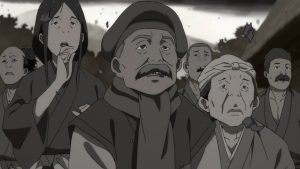 One of the measures of any adaptation is how it adapts. It’a not simply a matter of making images on paper move and talk – manga is one medium, anime is another. I think that’s especially true of really old works like Dororo (even the abortive first anime was half a century ago). Things have to be changed, gaps filled in, events rearranged. And while we often see a reflexive bias in anime fandom against original content (in this world “filler” is a four-letter word) I think Dororo is passing that test resoundingly well so far.
One of the measures of any adaptation is how it adapts. It’a not simply a matter of making images on paper move and talk – manga is one medium, anime is another. I think that’s especially true of really old works like Dororo (even the abortive first anime was half a century ago). Things have to be changed, gaps filled in, events rearranged. And while we often see a reflexive bias in anime fandom against original content (in this world “filler” is a four-letter word) I think Dororo is passing that test resoundingly well so far.
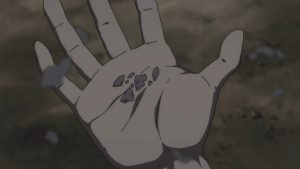 We’re eight episodes (out of 24) into the best series of the season so far (though that’s very close), and almost half of them have been comprised of original content. Kobayashi Yasuko is in charge of series composition and presumably much of the credit belongs to her, but whatever the case it’s working. The third episode (“The Story of Jukai”), last week’s and this week’s have been all or mostly new material. And for me at least, there’s no discernible difference in quality. #3 was a masterpiece, maybe the best of the series, and if there’s anything that stands out in the last two it’s not a different in quality, but tone.
We’re eight episodes (out of 24) into the best series of the season so far (though that’s very close), and almost half of them have been comprised of original content. Kobayashi Yasuko is in charge of series composition and presumably much of the credit belongs to her, but whatever the case it’s working. The third episode (“The Story of Jukai”), last week’s and this week’s have been all or mostly new material. And for me at least, there’s no discernible difference in quality. #3 was a masterpiece, maybe the best of the series, and if there’s anything that stands out in the last two it’s not a different in quality, but tone.
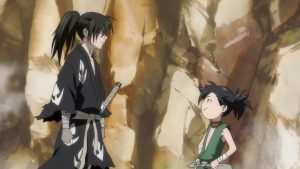 For me, there’s a distinct sense of hopefulness in these past two stories – false hope perhaps, but it enriches the diversity of the series as a whole. In a world as dark as the one depicted here it’s nice to see a little light once in a while. It’s also nice to see considerable attention devoted to building the bond between Hyakkimaru and Dororo, which is after all the backbone of the series. In effect Dororo is teaching Hyakkimaru how to be human, and that was a major focus of this episode.
For me, there’s a distinct sense of hopefulness in these past two stories – false hope perhaps, but it enriches the diversity of the series as a whole. In a world as dark as the one depicted here it’s nice to see a little light once in a while. It’s also nice to see considerable attention devoted to building the bond between Hyakkimaru and Dororo, which is after all the backbone of the series. In effect Dororo is teaching Hyakkimaru how to be human, and that was a major focus of this episode.
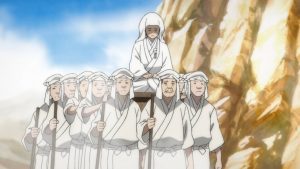 There’s a youkai here too, and this time it is one of Hyakkimaru’s targets. The local villagers call it “Nokesaregumo”, and know it as a mysterious black cloud that shows up occasionally, rains ash down on the village and eats the residents. But it’s actually a mukade, Japan’s giant centipede (for the record the real ones are only slightly less terrifying – and huge – than the youkai version). At some point the villagers figured out that by offering the mukade a “bride“, they could buy themselves some unmolested time – apparently a matter of years, judging by how surprised they were to see its return.
There’s a youkai here too, and this time it is one of Hyakkimaru’s targets. The local villagers call it “Nokesaregumo”, and know it as a mysterious black cloud that shows up occasionally, rains ash down on the village and eats the residents. But it’s actually a mukade, Japan’s giant centipede (for the record the real ones are only slightly less terrifying – and huge – than the youkai version). At some point the villagers figured out that by offering the mukade a “bride“, they could buy themselves some unmolested time – apparently a matter of years, judging by how surprised they were to see its return.
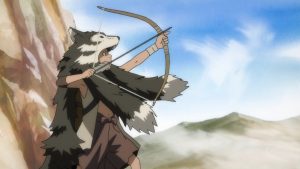 The humans are at the heart of the cruelty once again, but one can almost muster up a measure of sympathy for them here, given their circumstances – this was a recourse not uncommon in societies where pantheistic religions such as Shinto were observed (it’s ironic that the setting for this one is a highly volcanic mountain range). That’s no consolation to Saru, a young boy from the village whose big sister is the one chosen to be the bride this time. Saru is a wild child, an outcast living on his own since he was a toddler, and Onee-san isn’t his real sister, just the only person who’s ever shown any kindness towards him.
The humans are at the heart of the cruelty once again, but one can almost muster up a measure of sympathy for them here, given their circumstances – this was a recourse not uncommon in societies where pantheistic religions such as Shinto were observed (it’s ironic that the setting for this one is a highly volcanic mountain range). That’s no consolation to Saru, a young boy from the village whose big sister is the one chosen to be the bride this time. Saru is a wild child, an outcast living on his own since he was a toddler, and Onee-san isn’t his real sister, just the only person who’s ever shown any kindness towards him.
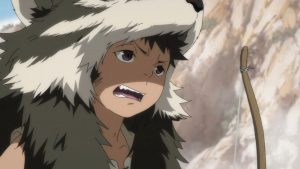 In addition to the bonding between Dororo and Hyakkimaru, this is an important episode for Dororo, period. There’s no question Dororo sees something familiar in the connection between Saru and Onee-san, and definitely in the pain and loneliness he feels after losing her to the mukade. Because the Nokesaregumo appears to Hyakkimaru as a giant wall of red aura, he’s largely helpless to fight it – which means Dororo and Saru have to try and figure out a way to do so on their own. Gold or not, one suspects that Dororo would not have walked away from Saru in this situation – and the courage Dororo shows when acting as bait to draw the mukade out into the sunlight is pretty remarkable.
In addition to the bonding between Dororo and Hyakkimaru, this is an important episode for Dororo, period. There’s no question Dororo sees something familiar in the connection between Saru and Onee-san, and definitely in the pain and loneliness he feels after losing her to the mukade. Because the Nokesaregumo appears to Hyakkimaru as a giant wall of red aura, he’s largely helpless to fight it – which means Dororo and Saru have to try and figure out a way to do so on their own. Gold or not, one suspects that Dororo would not have walked away from Saru in this situation – and the courage Dororo shows when acting as bait to draw the mukade out into the sunlight is pretty remarkable.
 While that plan ends up going disastrously wrong, fortunately Hyakkimaru is extremely smart – and he settles on using sound to locate the ayakashi. Eventually this requires Dororo to leap headlong into the fire again, but the rewards are considerable when the Nokesaregumo is vanquished. No, not (much) gold – but Onee-chan is still alive, and Hyaklkimaru gets his nose back. Hilariously his first sensation of smell is the sulphur from the volcano, which continues his run of bad luck having new senses introduced to him, but eventually a flower is brought in to help the transition. He also offers his second word – and the symbolism of the tonal change could hardly be more stark than when comparing it with the moment he uttered his first. Next week we return to Tezuka’s core material and, presumably, a more tragic tone, but I think both Hyakkimaru and the audience are better positioned to handle that after the events of the past two episodes.
While that plan ends up going disastrously wrong, fortunately Hyakkimaru is extremely smart – and he settles on using sound to locate the ayakashi. Eventually this requires Dororo to leap headlong into the fire again, but the rewards are considerable when the Nokesaregumo is vanquished. No, not (much) gold – but Onee-chan is still alive, and Hyaklkimaru gets his nose back. Hilariously his first sensation of smell is the sulphur from the volcano, which continues his run of bad luck having new senses introduced to him, but eventually a flower is brought in to help the transition. He also offers his second word – and the symbolism of the tonal change could hardly be more stark than when comparing it with the moment he uttered his first. Next week we return to Tezuka’s core material and, presumably, a more tragic tone, but I think both Hyakkimaru and the audience are better positioned to handle that after the events of the past two episodes.


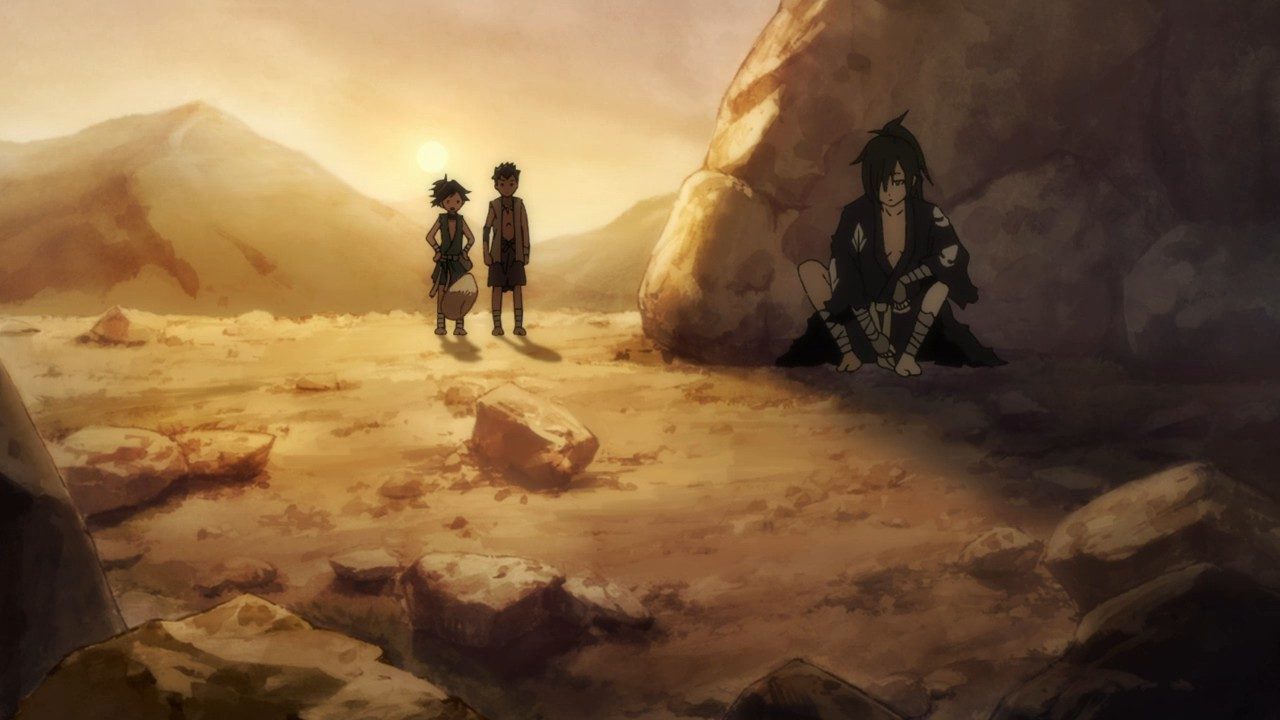

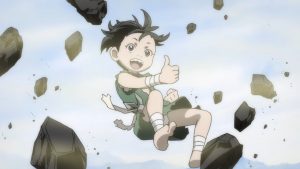
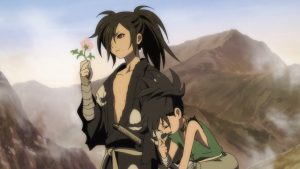
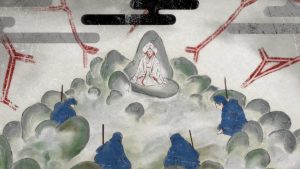
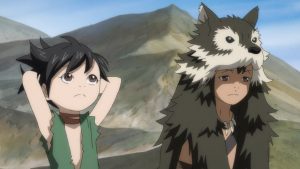
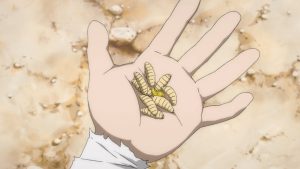
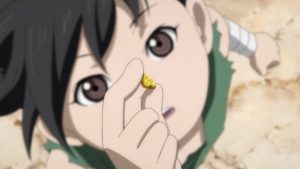




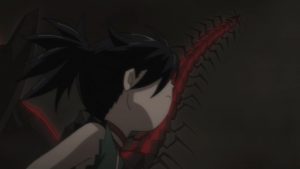
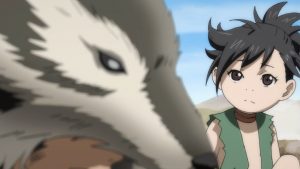

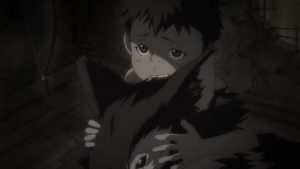
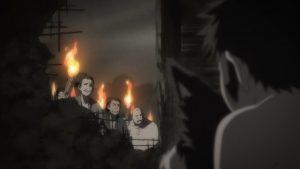

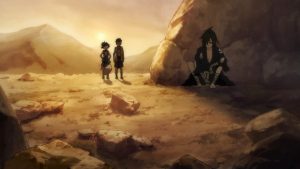

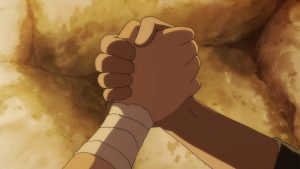
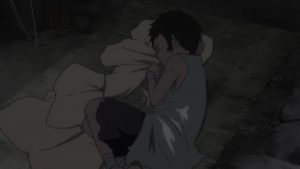
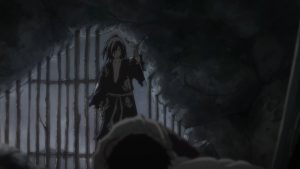


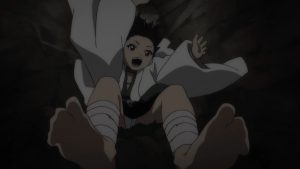
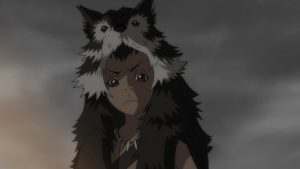
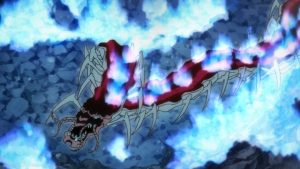

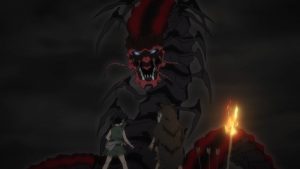
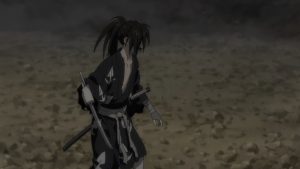
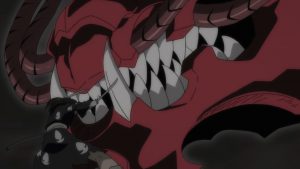
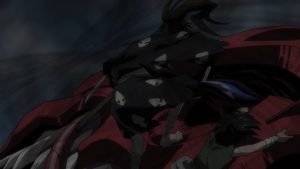
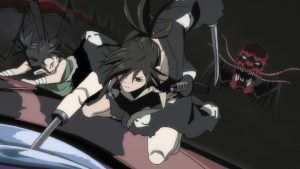
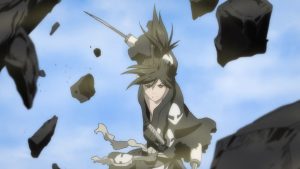
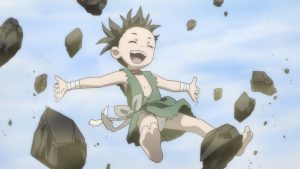

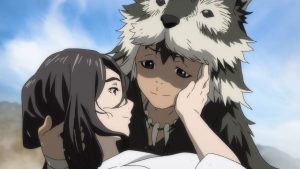
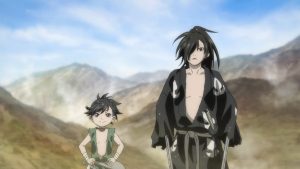
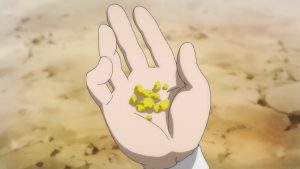
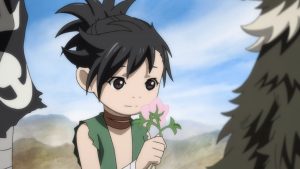
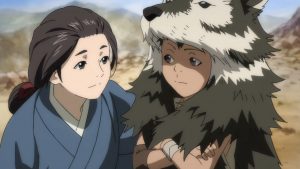
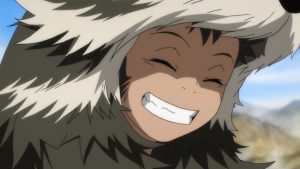



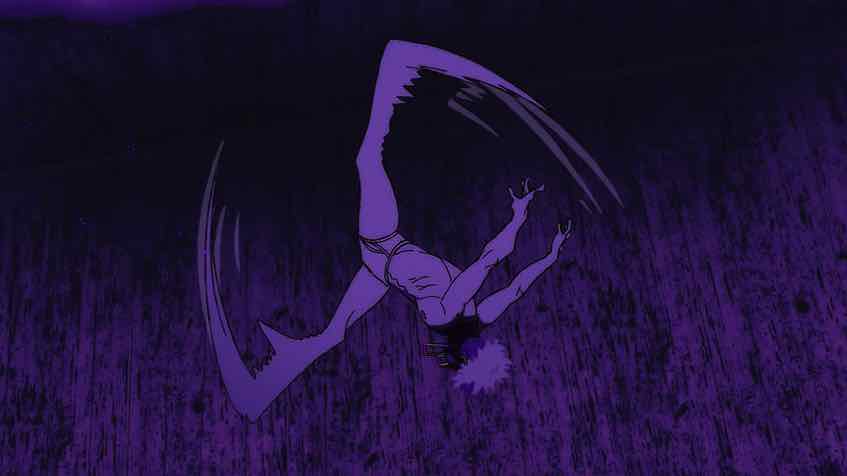
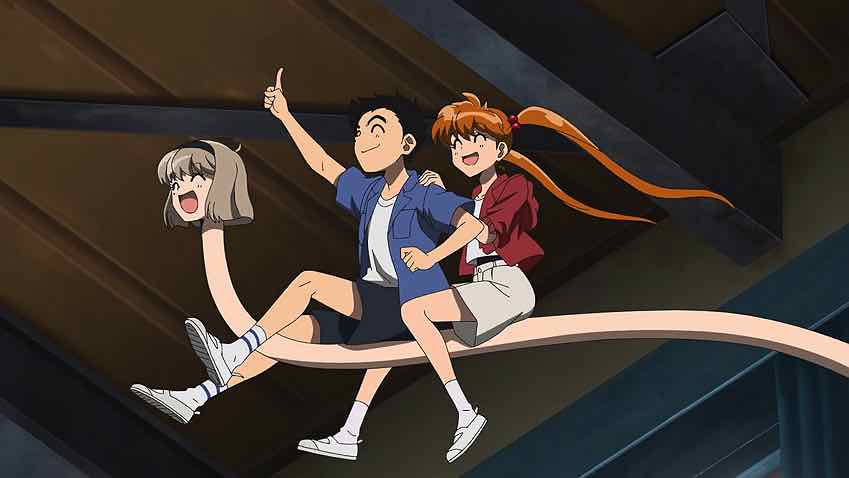
Miyu Fan
February 26, 2019 at 9:12 pmYes you can see the tone are more hopeful for the original episodes, but I love it because we need a breather from the heavy stuff and building relationship betweeen the two of them. I’m very happy that Nee-san was able to be saved in the end.
I’m looking forward to come back to the heavy stuff, with Hyakkimaru’s family finally is the focus on the next arc.
Guardian Enzo
February 26, 2019 at 10:44 pmThese last couple of eps remind me of the middle eps in Seirei no Moribito – many of which were original, served the same character-building role, and were bitched about by some viewers who’d read the source material.
Miyu Fan
February 27, 2019 at 12:15 amOh wow I watched Seirei no Moribito a few years ago and didn’t realise there are original episodes – the tone and characters remained consistent throughout the series. That’s a great adaptation with production team truly understand the soul of the original series, just like how Dororo and Mob Psycho are being treated now.
Don’t know why any fans would complain about that when it’s basically anime studio are enhancing the source material by expanding the story.
karma
February 27, 2019 at 6:17 amOne of my favorite episodes of Serei no Moribito is anime original – with Balsa visiting a blacksmith to have her spear repaired.
Guardian Enzo
February 27, 2019 at 12:03 pmAs is maybe my favorite one, where Chagum figures out the hustle going on with the gambling cart and Balsa realizes he’s no normal kid.
Having read the first part of the Moribito series and seen the live-action (which is quite good) I can say Kamyama’s anime is better than the original IMO.
bnbros
February 27, 2019 at 3:12 pmHyakkimaru’s first smell may not have been pleasant, but it’s thankfully under better circumstances than most of his previous senses which had to be accompanied by tragedy. I can only hope fate doesn’t deal him another nasty hand for his next body part.
Guardian Enzo
February 27, 2019 at 4:09 pmWhat if his next body part is literally a nasty hand?
bnbros
February 28, 2019 at 2:26 amWell then, it may not come in handy for his future conflicts, heh.
hgfdsahjkl
March 3, 2019 at 7:23 amI’d rank dororo 4 in the current season